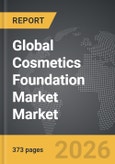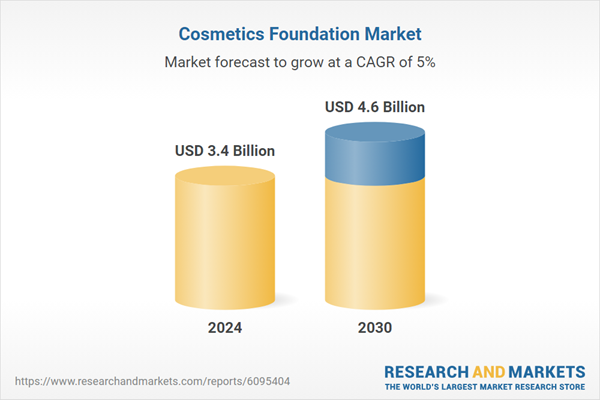Global Cosmetics Foundation Market - Key Trends & Drivers Summarized
How Has Cosmetics Foundation Evolved Beyond Traditional Beauty Products?
Cosmetics foundation has transformed from a basic complexion product into a multifunctional, technologically advanced formula designed to cater to increasingly diverse consumer demands. Once used primarily to cover blemishes and even out skin tone, foundation today serves a variety of purposes including hydration, sun protection, anti-aging benefits, and skin barrier repair. Brands are infusing foundations with active skincare ingredients like niacinamide, hyaluronic acid, peptides, and antioxidants to blur the line between makeup and dermatological care.This multifunctionality has positioned foundation as a core element in both daily beauty routines and hybrid skincare regimens. Simultaneously, the range of textures - such as liquid, powder, serum, cushion, and stick formats - caters to different skin types, preferences, and application methods. With the rise of natural and minimalistic makeup looks, lightweight, breathable, and sheer-finish foundations are gaining popularity, especially among Gen Z consumers. These shifts are redefining foundation not just as a cosmetic tool but as a customized personal care solution.
What Role Does Inclusivity and Personalization Play in Driving Innovation?
One of the most transformative changes in the foundation market is the industry-wide commitment to shade diversity and inclusive beauty. Leading brands now offer foundation ranges with 30 to 50+ shades, addressing a broader spectrum of skin tones and undertones across ethnicities. This move toward inclusivity has created a ripple effect, prompting indie brands and legacy players alike to reformulate and expand their offerings. Undertone matching, long-wear formulations, and adaptive pigments have become central to product development.Advanced shade-matching tools, including AI-based skin analyzers and virtual try-on apps, are improving the consumer shopping experience both online and offline. Personalization features - such as custom-blended foundations or skin profile-based recommendations - are enhancing customer satisfaction and brand loyalty. These tech-driven tools reduce product return rates and help consumers find the perfect match without guesswork. As makeup becomes more democratized, brands that deliver customization and authenticity are gaining market traction.
Which Sales Channels and Regional Trends Are Influencing Market Expansion?
Omnichannel distribution is key to the cosmetics foundation market, with e-commerce, brand websites, social media platforms, and in-store counters all playing vital roles in sales and consumer engagement. Online sales have surged, driven by digital tutorials, influencer endorsements, and real-time consumer feedback. Brick-and-mortar stores remain important for trial-based purchases, especially in regions with less digital penetration or a strong preference for tactile product evaluation.Regionally, North America and Western Europe remain leading markets due to higher consumer spending on premium beauty products and greater access to innovation. However, the Asia-Pacific region - particularly South Korea, China, and Japan - is emerging as a growth hotspot, influenced by K-beauty trends, innovative packaging, and an emphasis on natural-finish makeup. In the Middle East and Africa, rising urbanization and the proliferation of beauty-focused retail outlets are increasing product adoption across demographics. Localized marketing and culturally tailored shade offerings are essential in these high-growth geographies.
What Factors Are Driving Growth in the Cosmetics Foundation Market?
The growth in the cosmetics foundation market is driven by rising demand for inclusive beauty products, hybrid skincare benefits, and technological enhancements in product formulation and personalization. A major catalyst is the growing consumer expectation for multitasking foundations that provide both aesthetic and dermatological value. The increasing popularity of lightweight, natural-finish formulations among younger demographics is also fueling innovation in texture and delivery mechanisms.Technological integrations such as AI-based shade match tools and virtual try-ons are streamlining online purchasing, expanding market reach, and reducing friction in the buying journey. In emerging markets, rising disposable incomes, expanding beauty retail networks, and aspirational lifestyle consumption are accelerating demand. Additionally, the continued rise of social media influencers, beauty vloggers, and celebrity-endorsed brands is sustaining consumer interest and product experimentation, further propelling the foundation category's global expansion.
Report Scope
The report analyzes the Cosmetics Foundation market, presented in terms of market value (US$). The analysis covers the key segments and geographic regions outlined below:- Segments: Type (Cosmetics Foundation Cream, Cosmetics Foundation Powder, Cosmetics Foundation Liquid, Cosmetics Foundation Stick); Distribution Channel (Supermarkets / Hypermarkets, Specialty Stores, Online Distribution Channel, Other Distribution Channels); End-Use (Men End-Use, Women End-Use).
- Geographic Regions/Countries: World; United States; Canada; Japan; China; Europe (France; Germany; Italy; United Kingdom; Spain; Russia; and Rest of Europe); Asia-Pacific (Australia; India; South Korea; and Rest of Asia-Pacific); Latin America (Argentina; Brazil; Mexico; and Rest of Latin America); Middle East (Iran; Israel; Saudi Arabia; United Arab Emirates; and Rest of Middle East); and Africa.
Key Insights:
- Market Growth: Understand the significant growth trajectory of the Foundation Cream segment, which is expected to reach US$2.2 Billion by 2030 with a CAGR of a 6.4%. The Foundation Powder segment is also set to grow at 3.6% CAGR over the analysis period.
- Regional Analysis: Gain insights into the U.S. market, valued at $939 Million in 2024, and China, forecasted to grow at an impressive 8.2% CAGR to reach $926.3 Million by 2030. Discover growth trends in other key regions, including Japan, Canada, Germany, and the Asia-Pacific.
Why You Should Buy This Report:
- Detailed Market Analysis: Access a thorough analysis of the Global Cosmetics Foundation Market, covering all major geographic regions and market segments.
- Competitive Insights: Get an overview of the competitive landscape, including the market presence of major players across different geographies.
- Future Trends and Drivers: Understand the key trends and drivers shaping the future of the Global Cosmetics Foundation Market.
- Actionable Insights: Benefit from actionable insights that can help you identify new revenue opportunities and make strategic business decisions.
Key Questions Answered:
- How is the Global Cosmetics Foundation Market expected to evolve by 2030?
- What are the main drivers and restraints affecting the market?
- Which market segments will grow the most over the forecast period?
- How will market shares for different regions and segments change by 2030?
- Who are the leading players in the market, and what are their prospects?
Report Features:
- Comprehensive Market Data: Independent analysis of annual sales and market forecasts in US$ Million from 2024 to 2030.
- In-Depth Regional Analysis: Detailed insights into key markets, including the U.S., China, Japan, Canada, Europe, Asia-Pacific, Latin America, Middle East, and Africa.
- Company Profiles: Coverage of players such as Ann Chery, Bare Necessities, BellaMia, Burvogue, Corset Story and more.
- Complimentary Updates: Receive free report updates for one year to keep you informed of the latest market developments.
Some of the 37 companies featured in this Cosmetics Foundation market report include:
- Amorepacific Corporation
- Avon Products, Inc.
- Beiersdorf AG
- Coty Inc.
- Estée Lauder Companies
- e.l.f. Beauty
- Glossier, Inc.
- Huda Beauty
- IT Cosmetics (L'Oréal)
- Johnson & Johnson
- Kao Corporation
- L'Oréal S.A.
- Maybelline (L'Oréal)
- Mary Kay Inc.
- NARS Cosmetics (Shiseido)
- NYX Professional Makeup
- Oriflame Cosmetics
- Revlon, Inc.
- Shiseido Company, Limited
- Yves Rocher
This edition integrates the latest global trade and economic shifts into comprehensive market analysis. Key updates include:
- Tariff and Trade Impact: Insights into global tariff negotiations across 180+ countries, with analysis of supply chain turbulence, sourcing disruptions, and geographic realignment. Special focus on 2025 as a pivotal year for trade tensions, including updated perspectives on the Trump-era tariffs.
- Adjusted Forecasts and Analytics: Revised global and regional market forecasts through 2030, incorporating tariff effects, economic uncertainty, and structural changes in globalization. Includes historical analysis from 2015 to 2023.
- Strategic Market Dynamics: Evaluation of revised market prospects, regional outlooks, and key economic indicators such as population and urbanization trends.
- Innovation & Technology Trends: Latest developments in product and process innovation, emerging technologies, and key industry drivers shaping the competitive landscape.
- Competitive Intelligence: Updated global market share estimates for 2025, competitive positioning of major players (Strong/Active/Niche/Trivial), and refined focus on leading global brands and core players.
- Expert Insight & Commentary: Strategic analysis from economists, trade experts, and domain specialists to contextualize market shifts and identify emerging opportunities.
Table of Contents
Companies Mentioned (Partial List)
A selection of companies mentioned in this report includes, but is not limited to:
- Amorepacific Corporation
- Avon Products, Inc.
- Beiersdorf AG
- Coty Inc.
- Estée Lauder Companies
- e.l.f. Beauty
- Glossier, Inc.
- Huda Beauty
- IT Cosmetics (L'Oréal)
- Johnson & Johnson
- Kao Corporation
- L'Oréal S.A.
- Maybelline (L'Oréal)
- Mary Kay Inc.
- NARS Cosmetics (Shiseido)
- NYX Professional Makeup
- Oriflame Cosmetics
- Revlon, Inc.
- Shiseido Company, Limited
- Yves Rocher
Table Information
| Report Attribute | Details |
|---|---|
| No. of Pages | 373 |
| Published | February 2026 |
| Forecast Period | 2024 - 2030 |
| Estimated Market Value ( USD | $ 3.4 Billion |
| Forecasted Market Value ( USD | $ 4.6 Billion |
| Compound Annual Growth Rate | 5.0% |
| Regions Covered | Global |









